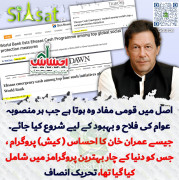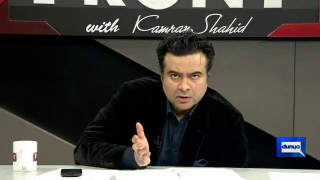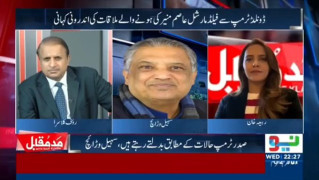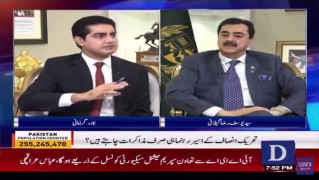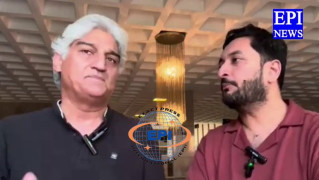scholar
Chief Minister (5k+ posts)
Govt seems unable to formulate a viable and holistic Counter-Terrorism policy, says Imran
PTI Chairman Imran Khan today expressed grave concern over the deteriorating security situation in the country. He stated that the government seems unable to formulate a viable and holistic Counter-Terrorism policy and a strategy to implement the same. In fact, Khan regretted that the government seems least interested in giving this issue top priority. Talks of an APC are meaningless until the government has a counter-terrorism policy to present before it.
Khan reiterated that we need a comprehensive counter terrorism policy where we identify the different types of terrorism impacting Pakistan and use politico-economic measures alongside security measures to counter these multiple types of terrorism on an emergency basis as governance is imploding and the state cannot bear the growing pressure. The security apparatus is overstretched and exposed in the absence of a holistic counter terrorism policy, with the under-equipped and under trained police force is the greatest sufferer.
As a first step, Khan again stated that Pakistan has to get out of the US War on Terror which has allowed terrorists to misuse the narrative of jehad against the Pakistani security forces – the police, paramilitary and military. By delinking from the US WoT, the Pakistani state will deprive the terrorists of the narrative of jehad and allow it to combat them within a more viable environment. While this is not the only policy component of an indigenous counter-terrorism strategy, it is a critical component, especially when it is accompanied by an immediate end to acceptance of drones. As Khan reminded, the illegality of drones is now well-established internationally and the Peshawar High Court decision is still pending implementation by the federal government. What is equally well-established, Khan went on, is the negative impact of drone attacks through creation of more space for terrorists.
This would be the PTI’s first suggested step in operationalising an effective counter-terror policy, especially in the context of Khyber Pukhtunkhwa which has been the province worst hit by terrorism directly arising out of the Pakistani state’s support for the US WoT and covert support for drone attacks on Pakistani soil. The ill-equipped police in Khyber Pukhtunkhwa have made immeasurable sacrifices in the front line of fighting terrorists who are equipped with latest weaponry and night vision devices. The Province cannot bear the costs of such a disastrous policy any longer. PTI is formulating a strategy to protest the continuing participation in the WoT and continuance of drones and “we will announce our line of action soon after the bye-elections”, Khan declared, “if the government is still unable or unwilling to present a holistic counter-terrorism policy, immediately extricate itself from the US WoT and stop drone attacks.”
Central Media Cell
Islamabad
PTI Chairman Imran Khan today expressed grave concern over the deteriorating security situation in the country. He stated that the government seems unable to formulate a viable and holistic Counter-Terrorism policy and a strategy to implement the same. In fact, Khan regretted that the government seems least interested in giving this issue top priority. Talks of an APC are meaningless until the government has a counter-terrorism policy to present before it.
Khan reiterated that we need a comprehensive counter terrorism policy where we identify the different types of terrorism impacting Pakistan and use politico-economic measures alongside security measures to counter these multiple types of terrorism on an emergency basis as governance is imploding and the state cannot bear the growing pressure. The security apparatus is overstretched and exposed in the absence of a holistic counter terrorism policy, with the under-equipped and under trained police force is the greatest sufferer.
As a first step, Khan again stated that Pakistan has to get out of the US War on Terror which has allowed terrorists to misuse the narrative of jehad against the Pakistani security forces – the police, paramilitary and military. By delinking from the US WoT, the Pakistani state will deprive the terrorists of the narrative of jehad and allow it to combat them within a more viable environment. While this is not the only policy component of an indigenous counter-terrorism strategy, it is a critical component, especially when it is accompanied by an immediate end to acceptance of drones. As Khan reminded, the illegality of drones is now well-established internationally and the Peshawar High Court decision is still pending implementation by the federal government. What is equally well-established, Khan went on, is the negative impact of drone attacks through creation of more space for terrorists.
This would be the PTI’s first suggested step in operationalising an effective counter-terror policy, especially in the context of Khyber Pukhtunkhwa which has been the province worst hit by terrorism directly arising out of the Pakistani state’s support for the US WoT and covert support for drone attacks on Pakistani soil. The ill-equipped police in Khyber Pukhtunkhwa have made immeasurable sacrifices in the front line of fighting terrorists who are equipped with latest weaponry and night vision devices. The Province cannot bear the costs of such a disastrous policy any longer. PTI is formulating a strategy to protest the continuing participation in the WoT and continuance of drones and “we will announce our line of action soon after the bye-elections”, Khan declared, “if the government is still unable or unwilling to present a holistic counter-terrorism policy, immediately extricate itself from the US WoT and stop drone attacks.”
Central Media Cell
Islamabad
Last edited by a moderator:



